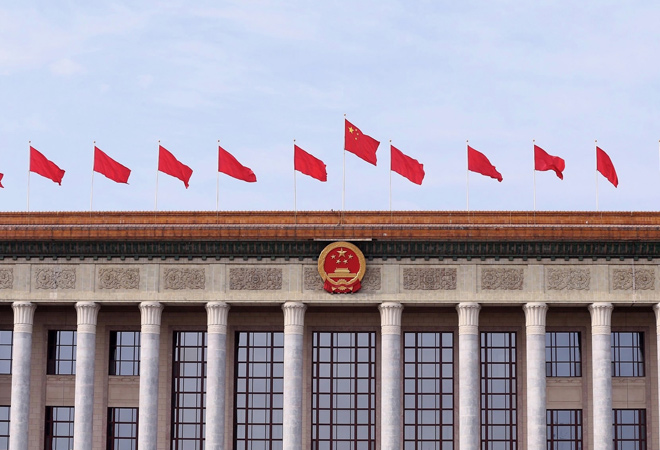-
CENTRES
Progammes & Centres
Location
The array of financial institutional reforms proposed at the ‘Two Sessions’ is indicative of continued regulatory interventionism by the CPC

The ‘Two Sessions’—China’s annual plenary sessions with close to 3,000 delegates participating in meetings of the National People’s Congress (NPC) and the Chinese People’s Political Consultative Conference (CPPCC)—have recently come to an end, and reports from the event carry significant implications for Chinese economic policy in the months to come.
China’s economy is witnessing headwinds amidst a post-COVID decline in demand and exports, intensifying US-China economic and technological competition, and regulatory pressures faced by the real estate and technology companies both internally and abroad, because of which the private sector has sustained varied losses. These range from a decline in investor confidence to increasing scrutiny and audit enforcement in Western countries. And even though the Chinese Communist Party (CPC) has made tactical adjustments through eased fiscal and monetary policies to stimulate economic growth, the direction of the policy is largely geared towards greater party control over the functioning of the private sector.
Highlights from the Two Sessions
The Two Sessions featured complex discussions on where the Chinese economy is headed. Li Qiang, the newly appointed premier, acknowledged in his press conference after the National People’s Congress (NPC) that, “China’s development is still unbalanced and inadequate,” and that “the prospect of the global economy this year is indeed not optimistic.” In tandem, key documents such as the Government Work Report and the Institutional Reform Plan released on 16 March, carry an ambitious reform agenda for party and state institutions.
China’s development is still unbalanced and inadequate," - Li Qiang, the newly appointed premier, acknowledging the current state of the Chinese economy after the recently concluded Two Sessions.
For example, the institutional reforms emphasise that the State Council has foregone control over economic policy, with the CPC Central Committee dictating the uniform policy on the functioning of markets and businesses. Effectively, the government has lost out to the party. However, Li Qiang also highlighted during his press conference, that, “The task of the new government is to implement and deliver on the important decisions and plans laid out by the Party Central Committee, turn the inspiring blueprint drawn up at the 20th Party Congress into an implementation scheme, and work with our people to step by step turn this blueprint into a beautiful reality.” This was reiterated in the ‘Work Rules of the State Council’ published on 24 March, which mentioned the role of the State Council staff being “political execution” and “faithful implementation of the party’s leadership in all areas of the government’s work.”
Hence, the State Council’s important implementational and administrative functions have been retained. This enables the CPC to deflect responsibility during times of crisis, enabling it to hold the government accountable for poor implementation, and not the shortcomings of the policy that is designed by the party itself.
In the financial sector, some of the institutional reforms include the dissolution of the China Banking and Insurance Regulatory Commission (CBIRC), and the replacement of its mandate with the National Financial Regulatory Administration, a new body that seems to carry more weight in theory than the CBIRC. Some of the roles of the other two pillars of the Chinese financial system, the People’s Bank of China (PBoC) and the China Securities and Regulatory Commission (CSRC) are also transferred to the new body, amid concerns pertaining to the rise of fintech and financial instability, and the lack of uniformity between central and provincial policies on the private economy.
Another such reform is the establishment of a Social Works Department under the CPC Central Committee, which is tasked with “handling public complaints and soliciting people's opinions,” as well as “Party building work in mixed-ownership and non-public enterprises, and new types of economic and social organizations and among groups in new forms of employment.”
What is common across these reforms is that the powers of the State Council have been diluted significantly, with its Financial Stability and Development Committee dissolved and replaced with the CPC-led Central Commission for Finance, and the ‘party-building’ jurisdiction of its Working Committee of the Central and State Organs and the Party Committee of the State-owned Assets Supervision and Administration Commission now placed in the hands of the Social Works Department.
The Chinese Communist Party's focus on greater control over the private sector, as evident from the recent Two Sessions, raises concerns about the future of private enterprises in China.
On the policy front, the focus is on allowing “reasonable” growth and expansion of the private sector. Both Li Qiang’s comments to the press and policy priorities highlighted in outgoing Premier Li Keqiang’s Work Report talk about promoting the “sound development of private businesses by removing barriers that hinder their entrepreneurial spirit.” However, the Work Report also sounds a warning: That the “unregulated expansion of the real estate sector” must remain under check, and policy institutions must prevent the “blind expansion of capital.”
Li Qiang’s first words as Premier may have been relatively more optimistic and business-friendly, but they shouldn’t be perceived as the CPC’s intent to return to the pre-COVID status quo on government intervention in the private sector, as also evident from the reduced powers of the State Council he now heads. This is also amply clarified by the fact that despite his assurances that “private enterprises will enjoy a better environment and broader space for development,” he reiterated that the ‘Two Unswervings’—a colloquial used for a CPC policy that has proved quite unpopular in the past with the private sector—is a “long-term policy” that remains unchanged.
The fate of private enterprises ahead
Since the CPC announced some economic relief beginning with the scrapping of the Zero-COVID policy, the policy narrative has shifted slightly towards infusing liquidity and relaxing restrictions on the property and platform economy industries. The readout of the December 2022 Chinese Central Economic Work Conference, for example, provided that the country will implement measures to “meet the reasonable financing needs of property developers, promote industrial restructuring and mergers, and improve assets and liabilities.” Then, at the Davos Forum in January 2023, China’s former Vice-Premier, Liu He, assured the international community that the country will continue to promote an “all-round opening up” of the economy, while also performing massive “blood transfusion” to the real estate sector.
Most recently, in February 2023, the China Securities Regulatory Commission announced that it “will relinquish its role in reviewing Initial Public Offerings (IPOs),” with an aim to leave the price of IPOs to the markets and stock exchanges and guarantee transparency to foreign firms. Today, the positive noises seem to have been exacerbated due to Li Qiang’s appointment as Premier, and with news of former Alibaba CEO Jack Ma’s return to the public spotlight in China almost a year after he retreated from the scene. Having relinquished control of Alibaba’s fintech service entity Ant Group in January 2023 after it was forced to give up its IPO in 2020 during the state’s crackdown on “sprawling private financial services,” while also having faced a US$ 275 billion fine for anti-monopoly violations in 2021, Jack Ma is now seeming to display a business-as-usual-attitude with his first recent reappearance at a school in Hangzhou.
While the government has made tactical adjustments to stimulate economic growth, the direction of policy is largely geared towards strengthening party control over the economy, which could have significant implications for the private sector in China.
But the bigger revelation is Alibaba’s announcement of 28 March that it would break up into six separate entities, of which five will, in the future, have the option to launch their own IPOs. Reportedly, the decision has been manoeuvred by Ma himself, who continues to hold considerable sway over senior executives and decision-makers within Alibaba, and thought that such a break up would not only sit well with the Chinese state’s anti-monopoly rhetoric, but will also enable more flexibility and access to capital for the subsidiary entities. Given that in the immediate aftermath of the announcement Alibaba witnessed a short-lived but massive spike in share prices, analysts suggest that foreign firms might be regaining trust in China’s tech ecosystem and are viewing Jack Ma’s return as promises of regulatory easing working.
But, as discussed above, from the array of financial institutional reforms proposed at the Two Sessions, followed by Li’s remarks on keeping the ‘Two Unswervings’ policy (which enables the CPC to “guide” its private sector economy however it likes) unchanged, and restricting the government’s role to that of an implementor of the party line, we are likely to expect continued regulatory interventionism by the CPC in private sector enterprises.
Broader efforts to reform the sector may also entail the introduction of mandatory ‘party-building’ policies for private enterprises, including through the creation of party groups and grassroots organisations associated with them. Such a regulation has already been introduced in the context of state-owned enterprises in 2020, when the ‘Two Unswervings’ were first iterated.
Xi Jinping’s own engagement with the private sector speaks volumes as well. Interacting with a group of government advisers representing private businesses during an NPC meeting on 6 March, Xi clarified that, “The private sector is an important force for our party to govern in the long term,” and that “we always regard private enterprises and private entrepreneurs as people on our own side.”
Moreover, the role he deemed fit for the private sector was to expand consumption, employment, and government income to achieve the broader national goals of high-quality growth and common prosperity. In asking enterprises to “shine on the global stage,” Xi meant not to give them free rein as individual entities, but to induct them as part of the CPC’s larger ambitions to set a global example of stellar economic recovery in an autocratic system. And it must be put in context that Xi gave these messages across even as he talked about boosting investor confidence and reviving market expectations.
The consequences have been evident. As per China’s National Bureau of Statistics, since January 2022, private fixed asset investment year-on-year has gone up by only 0.8 percent. This is despite the hyping up of positive signals around economic policy and private sector autonomy. The government’s own acknowledgement that 2023 will continue to witness dwindling growth, is its meagre 5 percent GDP growth target for the fiscal year. Hence, it is unlikely that we will see a return to a time before regulatory interventionism, and any over-the-top positivity in projections for the private sector’s or overall economic growth, must be taken with a bag of salt.
The views expressed above belong to the author(s). ORF research and analyses now available on Telegram! Click here to access our curated content — blogs, longforms and interviews.

Anushka Saxena is a Research Analyst with the Indo-Pacific Studies Programme at The Takshashila Institution. She can be reached at [email protected].
Read More +